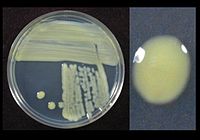
Photo from wikipedia
Bacterial spot caused by Xanthomonas euvesicatoria pv. euvesicatoria (Xanteu) is one of the major causes of yield losses in tomato ( Lycopersicon esculentum (L.) Karsten ex Farw.) crops. The disease… Click to show full abstract
Bacterial spot caused by Xanthomonas euvesicatoria pv. euvesicatoria (Xanteu) is one of the major causes of yield losses in tomato ( Lycopersicon esculentum (L.) Karsten ex Farw.) crops. The disease is mainly controlled by the use of cupric salts. The increasing demand for a more sustainable agriculture is urging the authorities to pass laws reducing the amounts of copper allowed. Therefore, the need to find new active antimicrobial principles is a priority, since costs, environmental damage and risks of selection of resistant bacterial strains are to be contained. The aim of the work was to investigate the potential antimicrobial properties of coumarin against Xanteu in order to define new sustainable control strategies which could lead to a significant reduction of copper. Results have shown that the use of half of the current copper hydroxide field dose and an innovative solution containing half of the current copper hydroxide field dose and 1% w/v coumarin makes it possible to diminish the bacterial population of Xanteu over time, while reducing the incidence and severity of in-planta disease.
Journal Title: Journal of Plant Diseases and Protection
Year Published: 2021
Link to full text (if available)
Share on Social Media: Sign Up to like & get
recommendations!